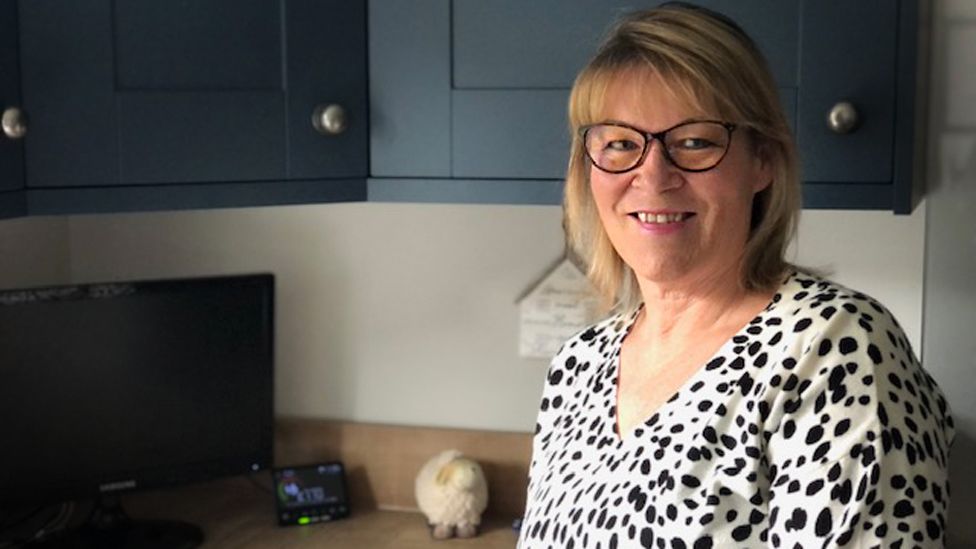ARTICLE AD BOX
 Image source, Karen Alexandra
Image source, Karen Alexandra
Karen Alexandra says the smart meter "can really prey on you"
By Colletta Smith
Cost of living correspondent
When Karen Alexandra moved into her new house she found it had an energy smart meter. She quite liked how it told her much she was spending in real time.
But as energy prices rocketed over the past year she found checking the meter was becoming an obsession.
"I realised it's the first thing I do in the morning, and when you see how much you've already spent it makes your tummy take a lurch," she told the BBC.
Charities have said they are hearing rising reports of smart meter anxiety.
Age UK and disability rights charity Scope have told the BBC that although smart meters can help with budgeting they can also have a negative impact on people's mental health.
Common signs of smart meter anxiety include repeatedly checking your smart meter, worrying about what it means for your finances and feeling out of control, said BBC Morning Live's Dr Ranj.
'Demon on your shoulder'
Karen's husband isn't well at the moment, so the couple are in the house a lot, which she thinks is part of the problem.
"When you're in the house and you've not got work to take your mind off it, it can really prey on you. It's almost like a demon on your shoulder constantly reminding you how much you've spent," she said.
Karen describes herself as having smart meter anxiety, and laughs while explaining that she's had to turn the display unit to face the wall.
Image source, Karen Alexandra
She has limited herself to only checking the meter at the start and end of each day. "I just don't want that financial worry to be in my face all the time," she said.
And she's not alone, one BBC Morning Live viewer, Catherine Lamb, contacted the programme to say that she had shut hers in a drawer, as she "was becoming too obsessed by it and panicking".
More than half of all households in the UK now have a smart meter. The government has spent billions on their roll out, and for many households they are a useful tool.
The smart device that sends automatic meter readings is within gas and electricity boxes, but they also come with a small in-home display unit.
It shows how much energy we're using in real-time so it can help identify the appliances and activities that cost the most.
It also shows how much we've been charged per day or week, so it can help you keep on top of rising energy bills.
But Age UK and Scope have told the BBC they are encountering people who find the in-home display a source of anxiety.
"When older people are struggling with their bills, as considerable numbers are, the constant pressure of watching the display dipping into the red after only a few hours of putting the heating on is really distressing," says Age UK charity director Caroline Abrahams.
The charity is calling for clearer instructions during installation and better phone support for those who are worried.
"If the government, Ofgem, and suppliers want older people to maintain confidence in smart meters they need to deliver tailored support to those for whom smart meters are a frightening reminder of just how unaffordable their energy bills currently are," says Ms Abrahams.
How to manage smart meter anxiety
BBC Morning Live's Dr Ranj said: "Anxiety can be situational or general. When it's related to devices like smart meters there are some simple steps that can help alleviate the stress". These are:
- Focus elsewhere - Set yourself limits on how much you check the meter and actively do other things to take your mind off it
- Get outside - If you can. It will mean you're not checking your meter and if you can get into a green space like a park then even better for your mental wellbeing
- Take control - Taking advantage of budgeting features on smart meters is one way of doing this, but don't be too hard on yourself if you go a bit over
- Don't catastrophise - Don't automatically assume you're going to get into financial difficulty because you're fixating on your energy usage
- Get help - Don't struggle alone. Speak to somebody to get it off your chest and there is help on the NHS website
Energy watchdog Ofgem said under its rules energy suppliers must give smart meter customers information in plain and easy to understand language.
They must also meet the needs of vulnerable groups such as the elderly, disabled or chronically sick.
Where these standards are not met, the regulator takes action "to protect customers during these very challenging times," it added. Ofgem's website has energy advice for households.
A spokesperson for the government said that energy suppliers are obliged to provide "tailored" advice at installation, to ensure people know how to benefit from the smart metering system.
"We understand people are concerned about energy prices which is why we have acted swiftly to provide support, including the Energy Price Guarantee, which is saving the typical household around £900 this winter", the spokesperson added.
While in-home displays show real-time costs, they don't show that spending in the context of the extra financial help from the government. All households are currently receiving a £67 discount every month until March, there are extra winter fuel payments to pensioners, and cost-of-living payments to those on certain disability benefits.
Image source, Michelle Dearden
Image caption,Michelle Dearden says she worries constantly about her energy costs
Michelle Dearden has complex post-traumatic stress disorder and autism. She fell behind with her energy bills when she became unwell and was switched to a pre-payment meter with a smart meter by her supplier.
She said looking at the device makes her anxious and fearful, but she needs to be able to see how much credit she has left on her account. She's resorted to hiding it behind a plant pot.
"I don't think they even thought about the effect a smart meter could have on people who are neurodiverse," said the 53-year-old from Mid-Wales.
"If I so much as put on the kettle, the screen switches from green to orange. For me that's like an orange warning light coming on your car while you're driving along and it's very stressful."
She constantly worries that the money is not going to last.
"There is nothing else I can cut back on," she said. "The gas heating only goes on if I need to use the bathroom or have a shower."
She said given the choice she would not have had a smart meter installed.
"It's not healthy, it is frustrating, embarrassing and degrading. I worry constantly and there is a shame attached about not being able to afford energy."
Image source, Tom Hargreaves
Image caption,Tom Hargreaves says he found a link between smart meters and stress more than 10 years ago
Dr Tom Hargreaves, an associate professor at the University of East Anglia, conducted a study more than 10 years ago with some of the first households to adopt smart meters.
He said he found a link to stress even then, when energy prices were much lower.
Dr Hargreaves said that worry became most pronounced when the householder felt they had already made all the energy efficiency savings they could, or when they had little choice but to use more energy such as when a child was ill.
"What we saw back then was a problem which could escalate. What's happened to energy prices since then has caused that escalation."
Although he believes smart meters are a very useful tool in reducing energy usage, he said they are a blunt instrument without other accompanying information.
"Smart meters have a tendency to individualise the problem, make owners feel that rising energy bills are to be dealt with by each household alone, and that adds to anxiety," he said.
Dr Ranj said if you find that your anxiety is really problematic seek help.
"Head over to the NHS website where you can access the Every Mind Matters resources including self-help cognitive behavioural therapy techniques, as well as referring yourself to talking therapies."
How do manage your smart meter anxiety? Share your tips by emailing haveyoursay@bbc.co.uk.
Please include a contact number if you are willing to speak to a BBC journalist. You can also get in touch in the following ways:
If you are reading this page and can't see the form you will need to visit the mobile version of the BBC website to submit your question or comment or you can email us at HaveYourSay@bbc.co.uk. Please include your name, age and location with any submission.

 2 years ago
49
2 years ago
49








 English (US) ·
English (US) ·